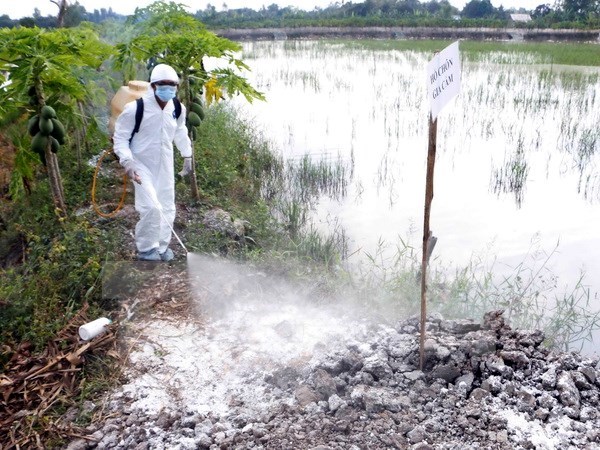The Prime Minister has asked for higher vigilance on the spread of A/H7N9 avian flu, which is reportedly breaking out in neighbouring China.

Spraying chemicals at avian flu outbreaks
According to the UN Food and Agriculture Organisation, in the first three months of this year, China had recorded 533 people infected with A/H7N9 and more than 2,000 virological samples from chickens, pigeons and ducks tested positive to the virus.
Therefore, Vietnam faces a high risk of the disease through the trade of smuggled poultry and poultry products with unclear origins.
To prevent the virus from entering Vietnam, the Prime Minister requested ministries and localities to ban all types of trading and slaughtering poultry and poultry products across the border between the two countries.
Monitoring activities should be expanded at border gates and paths along the borderlines on people from A/H7N9 outbreaks as well as at slaughterhouses and markets.
Exercises to respond to the avian flu disease once it occurs should be held to have effective preventive measures.
It is also necessary to collect samples from the environment and poultry in order to early detect A/H7N9 and other viruses which have yet to be recorded in Vietnam.
Ha Tinh announces new avian flu A/H5N1 outbreak

A new outbreak of avian influenza A virus subtype H5N1 has been detected in the central province of Ha Tinh, according to the Department of Animal Health under the Ministry of Agriculture and Rural Development.
The Ha Tinh Department for Breeding and Animal Health reported that the virus had been found in signs of the flu in a flock of 1,698 fowls at a family farm in Dai Nai ward in Ha Tinh city since March 21. Up to 50 ducks died and the test showed they infected with A/H5N1.
Local authorities culled the dead fowls and sprayed chemicals on the farm and surrounding areas to prevent the virus from spreading.
In the meantime, A/H5N1 is hitting Mekong Delta Can Tho city and southern Hau Giang province while an A/H5N6 outbreak is affecting central Quang Tri province.
According to the Department of Animal Health, Vietnam faces high risks of infection of new avian flu virus strains, such as A/H7N9, A/H5N2 and A/H5N8 via illegal transport, trading and consumption of poultry, particularly in northern border provinces.
The agency urged all localities to proactively prevent and control avian influenza and strengthen their supervision and punishment on poultry smuggling while monitoring their areas to promptly detect and handle any emerging outbreaks.
VNA